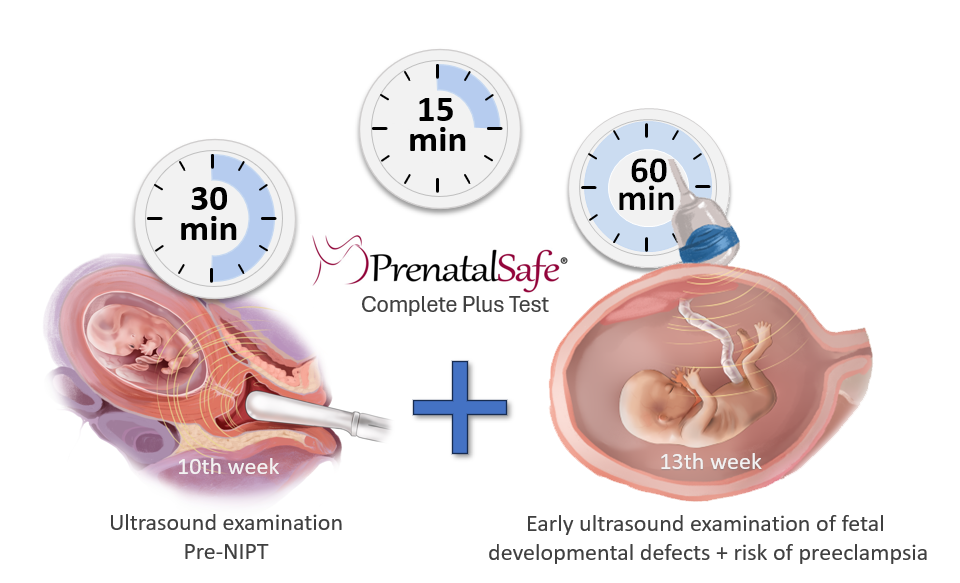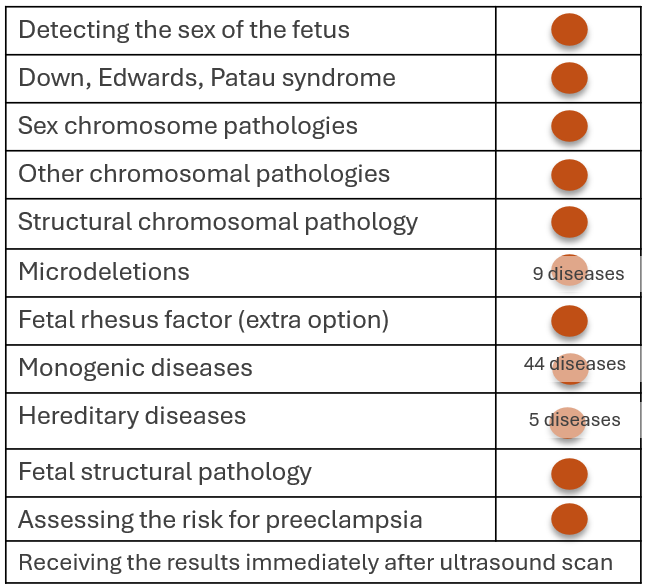Fetal Double test
Fetal Double test is an innovative and modern first trimester combined screening. It combines the strengths of two different non-invasive fetal extracellular DNA tests with the advantages of two high-tech ultrasound examinations of the fetus at different stages of development.
Fetal Double test, a very early ultrasound examination of fetal developmental defects together with KaryoPlus and GeneSafe Complete test at the 10th week of pregnancy and the combination of these studies with early detailed ultrasound diagnosis of the fetus and assessment of maternal risks during gestation at the 13th week of pregnancy, is currently one of the most accurate combined prenatal screening tests for the early detection of chromosomal and gene diseases and congenital developmental defects in children.
This combined screening helps to early detect nearly 100 different severe chromosomal or gene diseases and congenital developmental defects in the fetus that would otherwise remain undetected before birth or would only be detected later in pregnancy.
-
The Fetal Double test can detect the diseases listed below:
- Aneuploidy of chromosome 22 (including Down syndrome)
- Sex chromosome anomalies (including Turner syndrome)
- Rare chromosome deletions and duplications <7Mb (including Williams syndrome)
- 9 clinically significant microdeletions (including DiGeorge syndrome)
- 44 different genetic diseases (including Noonan syndrome)
- 5 hereditary monogenic diseases (including cystic fibrosis)
- Major severe congenital developmental defects (including spina bifida)
- Major severe heart defects (including transposition of large arteries)
In addition to detecting the pathology of the fetus, the Fetal Doubletest also provides an opportunity to find those women who may develop the following serious complications during pregnancy:
- Preeclampsia, in which the woman's kidney and liver function is disrupted, protein enters the urine and develops high blood pressure, which in more severe cases may be accompanied by a life-threatening seizure syndrome.
- Intrauterine growth retardation of the fetus, where the child does not reach its potential growth and lags in growth behind its peers. Due to a lack of food and oxygen, the gynecologist must monitor the growth and well-being of these fetuses with ultrasound more often and, if necessary, induce childbirth prematurely if the child's condition worsens.
- Premature birth due to a change in the structure of the cervix, as a result of which the cervix opens unnoticed during pregnancy, and the baby is born prematurely, when it is not yet able to cope with breathing outside the womb, maintaining the temperature and sucking on its own.
The Fetal Double test is the best choice for parents who want to get as much information as possible about pregnancy risks and their yet-unborn child
-
The Fetal Double test consists of two stages:
Step ONE: Pre-NIPT ultrasound scan and blood test for PrenatalSafe Complete Plus test (PrenatalSafe Karyo Plus test + GeneSafe Complete test) and blood test to determine placental hormones with pregnancy history and measurement of arterial blood pressure, weight and height at the 10th week of pregnancy. In addition to the mother's venous blood analysis, the test also requires an analysis of the child's father's oral mucosa.
Step TWO: Early diagnostic ultrasound examination of developmental defects in the fetus at the 13th week of pregnancy and immediately after this explanation of the results of the Fetal Double test, answering questions and, if necessary, giving recommendations for a pregnancy management plan. It is important to emphasize that if the GeneSafe test requires additional in-depth analysis by the laboratory, receiving the test result may take 7-10 days longer than previously promised. In this case, the answer to the GeneSafe test will not be revealed on the day of the ultrasound examination. Still, it will be sent to the patient's e-mail encrypted once the gene test answer arrives from the laboratory, together with the doctor's explanation.
- Combined screening is carried out for those whose pregnancy has lasted at least 10 full weeks (10 weeks + 0 days). If you would like to know the duration of your pregnancy, please visit our pregnancy calculator.
- With the combined test, you can also find out the gender of the fetus if desired. We offer the Fetal Double-NIPT test only for singleton pregnancies.
- If the blood test is given at the 10th week of pregnancy, then the written response of the combined screening will be known to the woman immediately after the ultrasound examination at the 13th week of pregnancy.
It is essential to highlight the following points:
- The Fetal Double test is not a substitute for the diagnostic ultrasound examination for fetal malformations conducted at the 20-week mark of pregnancy. The first-trimester ultrasound cannot identify all potential malformations.
- As a non-invasive screening test, the Fetal Double test cannot detect all chromosomal and genetic disorders that can be identified through diagnostic amniocentesis performed at the 16-week stage of pregnancy.


